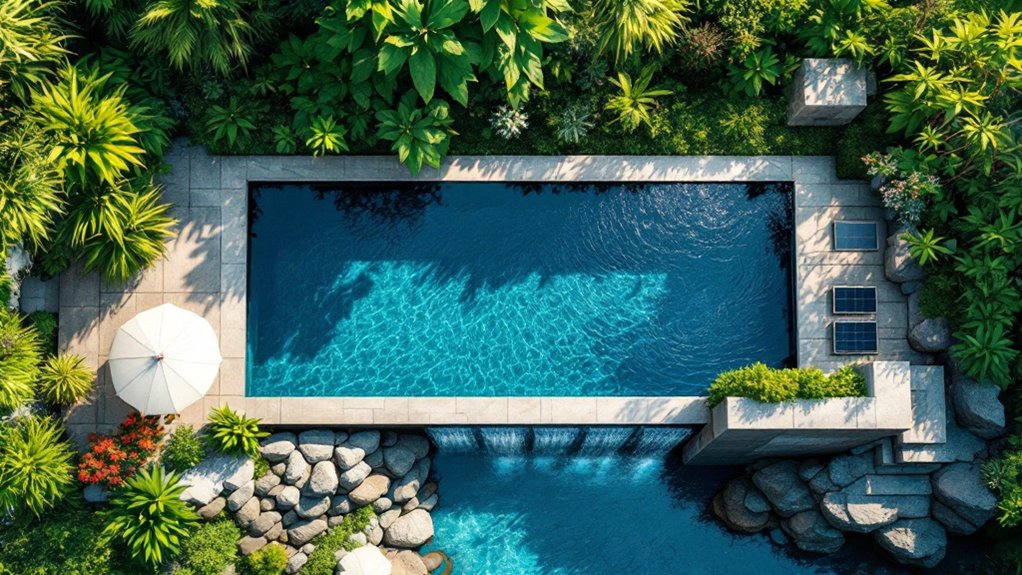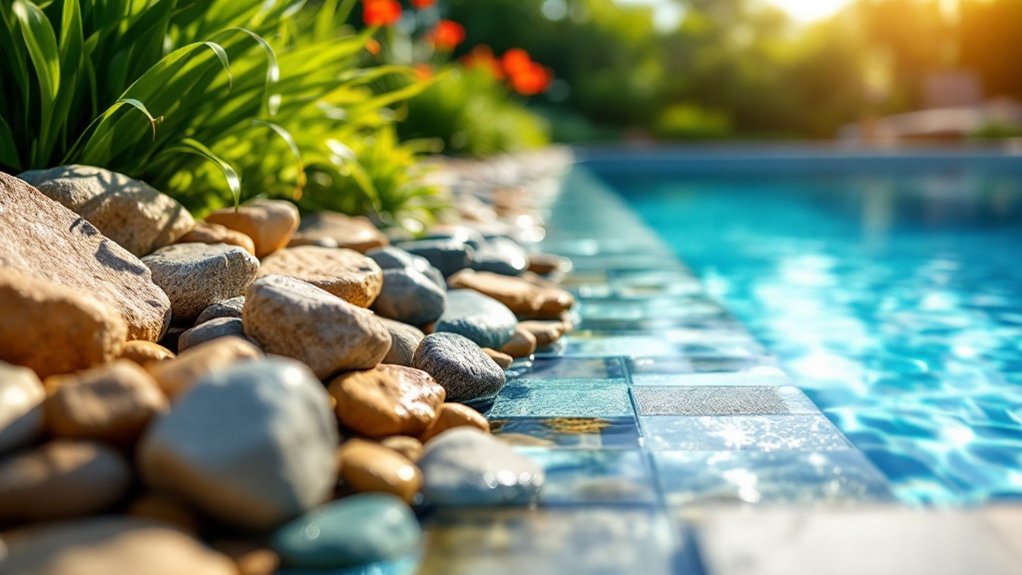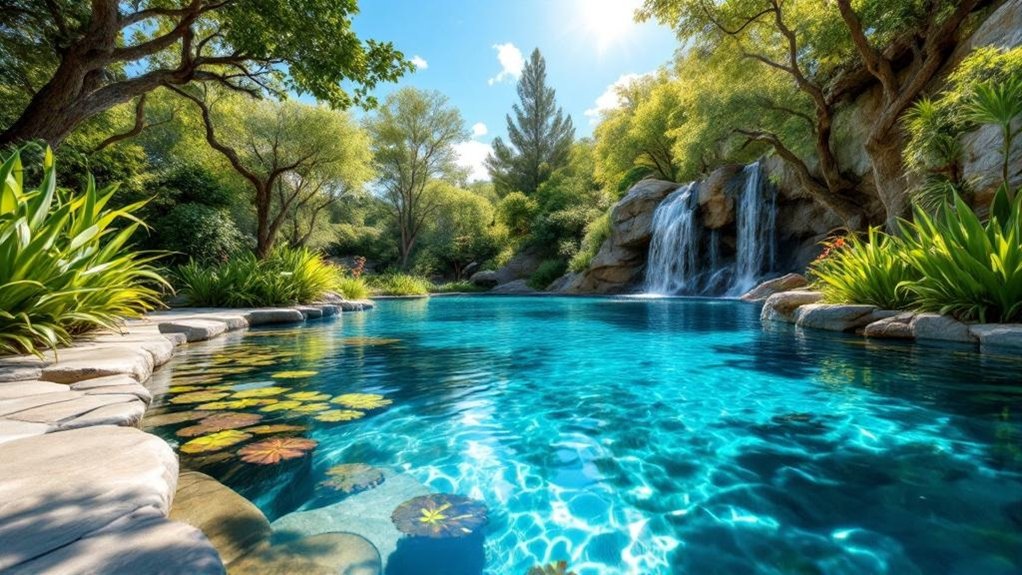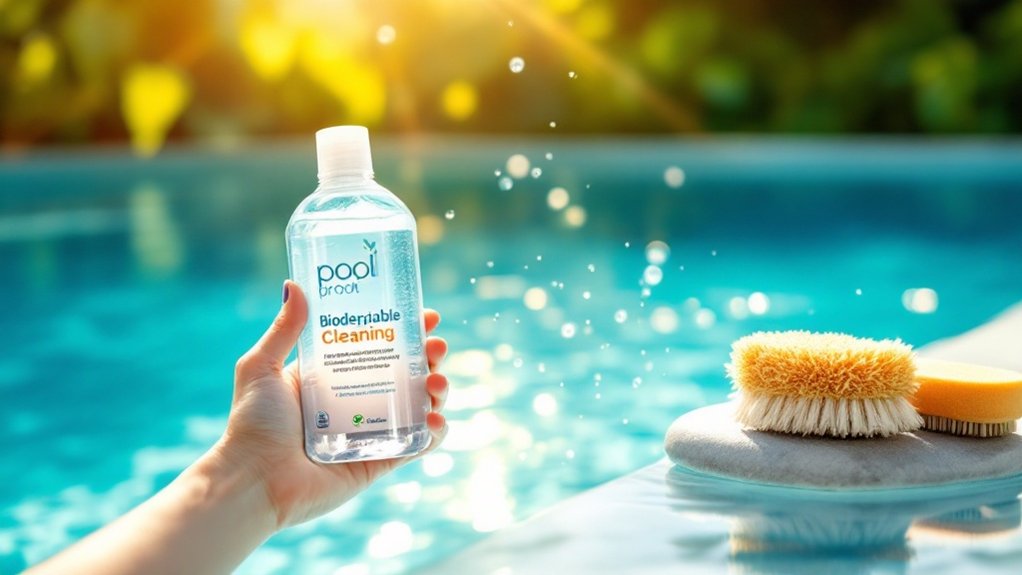The landscape of pool design is evolving with a focus on sustainability. Innovative ideas for 2024 emphasize energy-efficient heating solutions and natural filtration systems. These advancements aim to reduce environmental impact while enhancing user experience. Sustainable materials and smart technology are also gaining traction. As these concepts gain popularity, the question remains: how will these changes reshape the way we interact with our outdoor spaces?
Energy-Efficient Heating Solutions
Many homeowners are increasingly prioritizing energy-efficient heating solutions for their pools, recognizing both environmental benefits and cost savings. Among these solutions, heat pumps stand out for their ability to extract heat from the air or ground, making them a sustainable choice. Solar pool heaters, utilizing sunlight to warm water, are another popular option, offering significant savings on energy bills. Additionally, electric heaters serve as a reliable backup, providing quick heating when needed. Advanced temperature control systems enable users to optimize energy use, ensuring pools remain comfortable without excessive energy expenditure. By investing in these technologies, homeowners can enjoy their pools year-round while minimizing their carbon footprint and reducing utility costs, aligning with broader environmental goals. Furthermore, gas pool heaters offer a fast and dependable heating option that works efficiently regardless of the outside temperature.
Natural Filtration Systems
As homeowners seek to enhance the sustainability of their pool environments, natural filtration systems are gaining attention for their eco-friendly approach to water purification. These systems typically utilize plants, sand, and gravel to filter water, mimicking natural ecosystems. Unlike traditional chemical treatments, natural filtration reduces harmful chemical usage, promoting a healthier swimming environment. Additionally, these systems can lower maintenance costs and energy consumption, making them a practical choice for environmentally conscious pool owners. By integrating aquatic plants like lilies and reeds, homeowners not only improve water quality but also create aesthetically pleasing landscapes. As awareness of environmental issues grows, natural filtration systems represent an innovative solution that aligns with sustainable living practices while providing a unique swimming experience.
Recycled and Sustainable Materials
Incorporating recycled and sustainable materials into pool design not only enhances the aesthetic appeal but also considerably reduces environmental impact. Designers are increasingly utilizing materials such as reclaimed wood, recycled glass tiles, and eco-friendly concrete. Reclaimed wood, sourced from old barns or furniture, adds a rustic charm while minimizing deforestation. Recycled glass tiles offer vibrant colors and patterns, diverting waste from landfills. Additionally, eco-friendly concrete options, made from industrial byproducts, provide durability without compromising sustainability. These materials contribute to a pool’s unique character while promoting responsible consumption. By choosing recycled and sustainable options, pool owners can create a beautiful aquatic environment that aligns with modern ecological values, fostering a deeper connection to nature and encouraging sustainable living practices.
Eco-Friendly Pool Covers
A variety of eco-friendly pool covers are transforming the way pool owners protect their investments while promoting sustainability. These covers are typically made from recycled materials, such as plastic bottles and other eco-conscious substances, reducing environmental impact. Additionally, many options feature solar technology, harnessing sunlight to keep water warm and minimize evaporation.
These innovative covers also contribute to energy efficiency by reducing the need for heating and chemical use, aligning with the increasing demand for sustainable practices. They are designed to be durable, ensuring long-term use and less frequent replacements. As more homeowners prioritize eco-conscious choices, these pool covers emerge as a practical solution for maintaining pool health while supporting a greener future.
Integrated Landscaping for Biodiversity
Integrating landscaping with pool design not only enhances aesthetic appeal but also promotes biodiversity in residential spaces. By incorporating native plants and creating natural habitats, homeowners can attract various species, including birds, butterflies, and beneficial insects. Designing poolside gardens with diverse flora helps sustain local ecosystems and provides essential food and shelter for wildlife. Additionally, water features such as ponds or streams can further enhance biodiversity while offering a serene atmosphere. Implementing permeable materials in surrounding pathways allows for better water absorption, reducing runoff and supporting healthy soil ecosystems. Overall, integrated landscaping creates a harmonious balance between recreational spaces and nature, fostering environmental stewardship while enriching the outdoor experience for residents and their communities.
Solar Pool Heating and Power Generation
Solar pool heating offers numerous benefits, including enhanced comfort and extended swimming seasons. When integrated thoughtfully into the overall pool design, these systems can seamlessly blend aesthetics with functionality. Additionally, homeowners can achieve significant cost savings on energy bills, making solar solutions an attractive option for sustainable pool design in 2024.
Benefits of Solar Heating
While traditional heating methods for pools can be costly and environmentally damaging, solar heating offers a sustainable alternative that benefits both homeowners and the planet. This innovative approach utilizes renewable energy from the sun, markedly reducing electricity bills and reliance on fossil fuels. Solar heating systems are low-maintenance and have a long lifespan, making them a wise investment for pool owners. Additionally, they contribute to lower carbon emissions, promoting environmental sustainability. By harnessing solar energy, homeowners can enjoy extended swimming seasons while minimizing their ecological footprint. Moreover, solar heating enhances the value of properties, appealing to eco-conscious buyers. To conclude, the benefits of solar heating are numerous, offering financial savings and environmental advantages.
Integration With Pool Design
When incorporating sustainable energy solutions into pool design, solar pool heating and power generation can seamlessly blend aesthetics with functionality. Integrating solar panels into the pool’s structure not only enhances energy efficiency but also contributes to a modern, sleek look. These systems can be designed as part of the pool deck or incorporated into stylish pergolas, ensuring they complement the overall environment. Additionally, the use of solar thermal collectors can be harmoniously integrated into the landscape, reducing visual disruption while maximizing sunlight exposure. By adopting these innovative designs, pool owners can create a visually appealing space that promotes sustainability, making solar technology an integral aspect of contemporary pool architecture. This fusion of form and function is essential for future-forward pool designs.
Cost Savings Overview
Integrating sustainable energy solutions into pool design not only enhances aesthetics but also offers significant cost savings over time. Solar pool heating systems can substantially reduce energy bills by harnessing the sun’s energy to maintain ideal water temperatures. These systems typically have a short payback period, often recouping initial investments within a few years. Furthermore, incorporating solar power generation can further offset electricity costs, allowing pool owners to operate pumps and lighting without relying solely on grid energy. Increased efficiency and lower utility expenses provide long-term financial benefits. Additionally, tax incentives and rebates for renewable energy installations can also contribute to additional savings, making solar solutions an attractive choice for eco-conscious pool owners looking to minimize costs.
Water Conservation Techniques
Water conservation techniques are essential for creating sustainable pool designs in 2024. Implementing rainwater harvesting systems, efficient filtration methods, and smart irrigation solutions can greatly reduce water waste while maintaining pool quality. These strategies not only benefit the environment but also enhance the overall efficiency of pool management.
Rainwater Harvesting Systems
How can homeowners effectively reduce their reliance on municipal water supplies while enhancing their pool’s sustainability? One innovative solution is the implementation of rainwater harvesting systems. By installing gutters and downspouts connected to a storage tank, homeowners can capture and store rainwater for pool use. This method not only conserves precious resources but also minimizes runoff. The harvested rainwater can be used to maintain pool levels, especially during dry spells, thereby reducing the need for treated water from municipal sources. Additionally, integrating filtration systems guarantees that the collected rainwater meets quality standards for pool maintenance. As awareness of environmental issues grows, rainwater harvesting presents a practical and eco-friendly approach to pool sustainability in 2024.
Efficient Filtration Methods
Efficient filtration methods play an essential role in enhancing pool sustainability while conserving water. Advanced filtration technologies, such as cartridge filters and diatomaceous earth filters, require less water for backwashing compared to traditional sand filters. Additionally, employing variable-speed pumps can optimize energy consumption and reduce water waste by adjusting flow rates based on filtration needs. Utilizing automatic skimmers and surface vacuums can help maintain water clarity and reduce the need for frequent water replacement. Moreover, integrating smart filtration systems equipped with sensors can monitor water quality and automate cleaning processes, thereby minimizing unnecessary water use. By adopting these innovative filtration techniques, pool owners can greatly lower their environmental impact while ensuring a clean and enjoyable swimming experience.
Smart Irrigation Solutions
Many pool owners are turning to smart irrigation solutions to enhance water conservation and promote sustainable landscaping. These advanced systems utilize weather data and moisture sensors to optimize water usage, ensuring that gardens and lawns receive the precise amount of irrigation needed. By integrating smart controllers, homeowners can schedule watering times and durations based on real-time conditions, reducing waste and preventing overwatering. Additionally, some systems can connect to mobile apps, allowing users to monitor and adjust settings remotely. This technology not only conserves water but also contributes to healthier landscapes by delivering water directly to the plant roots. As sustainability becomes increasingly important, smart irrigation systems represent a forward-thinking approach for pool owners looking to minimize their environmental impact.
Smart Technology for Pool Management
The integration of smart technology is revolutionizing pool management, making it more efficient and user-friendly. Homeowners can now monitor and control their pools remotely through mobile applications, allowing adjustments to temperature, lighting, and filtration systems with ease. Smart sensors provide real-time data on water quality, alerting users to imbalances that require immediate attention. Automated cleaning systems, guided by artificial intelligence, guarantee that pools remain pristine with minimal manual effort. Additionally, energy-efficient pumps and heaters can be programmed to operate during off-peak hours, reducing energy costs and environmental impact. Overall, these advancements not only enhance user experience but also contribute to sustainable pool management practices, aligning with the growing demand for eco-friendly solutions in 2024.
Frequently Asked Questions
What Are the Initial Costs for Sustainable Pool Design?
The initial costs for sustainable pool design can vary considerably, influenced by factors such as materials, technology, and size. Generally, investment in eco-friendly features tends to be higher upfront but offers long-term savings and benefits.
How Long Do Eco-Friendly Pool Materials Last?
The longevity of eco-friendly pool materials varies, typically lasting between 15 to 30 years. Factors influencing durability include climate, maintenance, and material quality, which collectively determine the lifespan of these sustainable choices in pool design.
Can I Retrofit My Existing Pool With Sustainable Features?
The possibility of retrofitting an existing pool with sustainable features exists. Homeowners can implement solar heating, energy-efficient pumps, and eco-friendly materials, enhancing their pool’s sustainability while reducing environmental impact and energy costs effectively.
What Maintenance Is Required for Natural Filtration Systems?
Natural filtration systems require regular maintenance, including monitoring water quality, cleaning filter materials, managing aquatic plants, and occasionally replacing components. Proper upkeep guarantees effective filtration and promotes a healthy aquatic environment, enhancing overall pool functionality.
Are There Specific Plants for Integrated Landscaping?
The question of specific plants for integrated landscaping often arises. Suitable choices include native aquatic plants, such as water lilies and cattails, which enhance aesthetics while promoting biodiversity and supporting natural filtration systems in aquatic environments.
Conclusion
Ultimately, the innovative sustainable pool design ideas for 2024 exemplify a commitment to environmental stewardship while enhancing the swimming experience. By incorporating energy-efficient heating solutions, natural filtration systems, and eco-friendly materials, these designs promote water conservation and biodiversity. The integration of smart technology further optimizes pool management, ensuring a harmonious balance between luxury and sustainability. Embracing these principles not only benefits the environment but also transforms backyards into serene, eco-conscious retreats.




